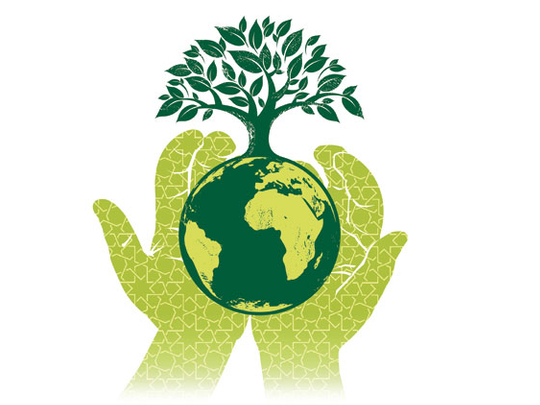
In the history of mankind, religion has been the main supporter of environmental protection. All religions call for environmental stewardship to different degrees. However, Islam is unique when it comes to environmental issues because:
• It emphasises the necessity and importance of environmental protection so that man can live in harmony with nature, as well as to achieve sustainable development, enrich life on earth, and make best use of available resources. There is extensive mention about environmental issues, cases, circumstances and components in the Quran and Hadith (the sayings of Prophet Mohammad [PBUH]), the two main sources of Islamic teachings. Thus we can find Quranic surahs (verses) named after natural phenomena, insects, animals … etc.
• All the concepts, causes and ideas related to the environment which have appeared in the past few decades — such as sustainable development, ecological balance and quality of life, to name a few — are mentioned in the Quran or Hadith.
• Islam talks not only of the relationship between Allah and man, and between peoples, but also provides guidelines on how to deal with our environment and natural resources in a better way in all situations — peace and war, affluence and scarcity, polluted or clean environment and so on.
It is important to mention that Islam not only calls for environmental protection but also advocates care for the environment. The concept of caring for the environment is more comprehensive and deeper than protection as it involves different aspects such as protection from damage and pollution, as well as allowing for the environment to flourish.
Before explaining more about Islamic guidance on care for the environment, let me answer this question: What is Islam?
• As a Muslim, you surrender to Allah and believe in Allah, all his messengers and the last of them, Prophet Mohammad (PBUH).
• If you believe this, then you must obey him, do as he ordered and refrain from doing what he has forbidden (Ebadat).
So the next question: Is that all there is to being a Muslim? The answer is definitely no. There is another important request from Allah to man to ensure that the earth develops and prospers. So, if a man just spends his time praying to Allah, then something is missing in his worship. That is why Allah made man a custodian on earth, as is evident from the following Quranic verses:
"And to Thamud [people We sent] their brother Salih. He said: "O my people! Worship Allah: you have no other ilah [god] but Him. He brought you forth from the earth and settled you therein [with request to develop], then ask forgiveness of Him and turn to Him in repentance. Certainly, my Lord is Near [to all by His Knowledge], Responsive"(Hud 11:61).
In Islam, man's relation to the earth is seen as that of a custodian. "Now, behold! Your Lord said to the angels: I am placing upon the earth a human successor to steward it" (Al Baqarah 2:30). It is required that man should work towards the conservation of earth, ensuring sustainability of natural resources for future generations. He must not be extravagant in consumption, whether of food, cloth or natural resources. As cited in the Quran: "Eat and drink of that which Allah has provided and do not act corruptly, making mischief on the earth" (Al Baqarah 60). In short, to be a Muslim is to pray [worship] and to be a custodian [to develop earth]. This is very clear in literature on the fundamentals of Islamic religion.
Pursuit of development
What is really amazing is that man on earth — with many different religions or with no religion at all — is working hard in various fields in life to innovate, develop and prosper. This quality is specific to man. No other creature on earth pursues development.
There are general guidelines that guide us to develop the earth. In fact, man's mission is to improve things or, in a worst-case scenario, to maintain things as they are. From an environmental perspective, this is the idea of quality of life.
In fact, Islam supports anything that benefits man and forbids anything that is harmful or evil for man. The latter includes, of course, pollution and environmental degradation or damage.
In other words, Islam calls on man to care for the environment, enjoy its beauty and not spoil it, as is clearly evident from the following verses "and do good as Allah has been good to you, and seek not mischief in the land. Verily, Allah likes not the Mufsidun [those who commit great crimes and sins, oppressors, tyrants, mischief-makers, corrupters]" (Al Qasas 28:77).
In the next column, I will explain the idea of mischief and spoilage and the Islamic view on current environmental issues as well as focus on the issue of the environment and the month of Ramadan.
Dr Mohammad Abdel Raouf is in charge of environment research at the Gulf Research Centre, Dubai.
This article is the first in a two-part series. The second article will be published on September 3.












